GALLUP NEWS SERVICE
PRINCETON, NJ -- In the latest CNN/USA Today/Gallup survey of Democrats who are registered to vote, conducted Oct. 6-8, Ret. Army Gen. Wesley Clark receives the most support, 21%, followed by former Vermont Gov. Howard Dean (16%), Connecticut Sen. Joe Lieberman (13%), Massachusetts Sen. John Kerry (13%), and Missouri Congressman Richard Gephardt (8%). These results are based on a sample size of 400 registered voters who indicate either that they identify with, or that they "lean" to, the Democratic Party.
These results are similar to those of a Gallup Poll conducted Sept. 19-21, suggesting no significant changes in support over the past two and a half weeks. Clark's entry into the race, just prior to the Sept. 19-21 poll, dramatically altered the character of the race, and now two polls show him as the clear front-runner. Because these polls provided similar results, they were combined to allow for an analysis of candidate support by demographic subgroups. The combined polls show Clark with an average lead of seven points over Dean, 22% to 15%. Lieberman and Kerry enjoy an average of 12% support, followed by Gephardt at 10%.
| Percentage of Democrats and Lean
Democrats Who Support Each Candidate |
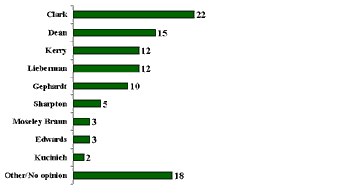 |
| Sept. 19-21 & Oct. 6-8, 2003 |
|
TABLE OF COMBINED RESULTS (N=823) SUPPORT FOR DEMOCRATIC CANDIDATES AMONG REGISTERED VOTERS WHO IDENTIFY WITH, OR LEAN TO, THE DEMOCRATIC PARTY Sept. 19-21 and Oct. 6-8 |
|||||||
|
Clark |
Dean |
Kerry |
Lieberman |
Gephardt |
Other |
No |
|
|
% |
% |
% |
% |
% |
% |
% |
|
|
Overall |
22 |
15 |
12 |
12 |
10 |
15 |
15 |
|
Gender |
|||||||
|
Male |
29 |
17 |
10 |
10 |
11 |
11 |
12 |
|
Female |
16 |
13 |
13 |
13 |
9 |
19 |
18 |
|
Race |
|||||||
|
White |
24 |
17 |
14 |
12 |
10 |
10 |
14 |
|
Black |
15 |
7 |
6 |
11 |
6 |
35 |
20 |
|
Age |
|||||||
|
18 to 29 |
21 |
16 |
13 |
11 |
4 |
22 |
13 |
|
30 to 49 |
18 |
16 |
12 |
12 |
10 |
19 |
13 |
|
50 to 64 |
20 |
15 |
15 |
10 |
10 |
10 |
20 |
|
65+ |
32 |
9 |
7 |
14 |
14 |
9 |
15 |
|
Region |
|||||||
|
East |
20 |
17 |
22 |
10 |
8 |
13 |
10 |
|
Midwest |
17 |
14 |
9 |
15 |
13 |
13 |
19 |
|
South |
25 |
8 |
7 |
11 |
9 |
22 |
18 |
|
West |
23 |
22 |
9 |
12 |
8 |
11 |
15 |
|
Income |
|||||||
|
Less than $20,000 |
26 |
5 |
13 |
10 |
7 |
20 |
20 |
|
$20,000-$30,000 |
17 |
15 |
16 |
13 |
7 |
18 |
13 |
|
$30,000-$50,000 |
18 |
10 |
8 |
14 |
12 |
20 |
18 |
|
$50,000-$75,000 |
21 |
18 |
14 |
11 |
11 |
9 |
16 |
|
$75,000+ |
25 |
26 |
13 |
8 |
8 |
12 |
8 |
|
Party Strength |
|||||||
|
Democrat |
21 |
13 |
10 |
11 |
10 |
16 |
18 |
|
Lean Democrat |
23 |
17 |
17 |
13 |
7 |
13 |
10 |
|
Ideology |
|||||||
|
Liberal |
18 |
24 |
14 |
10 |
9 |
13 |
12 |
|
Moderate |
24 |
11 |
12 |
12 |
9 |
14 |
18 |
|
Conservative |
23 |
7 |
9 |
13 |
10 |
22 |
16 |
|
Religion |
|||||||
|
Protestant |
21 |
12 |
8 |
10 |
12 |
19 |
17 |
|
Catholic |
23 |
15 |
18 |
12 |
8 |
12 |
12 |
The other four candidates -- the Rev. Al Sharpton (5%), former Illinois Sen. Carol Moseley Braun (3%), North Carolina Sen. John Edwards (3%), and Ohio Congressman Dennis Kucinich (2%) -- all enjoy single-digit support.
Support by Region
Clark leads or is tied for first place in all four regions of the country, but in comparison with the other candidates he is especially strong in the South (Clark is from Arkansas). There, Clark receives 25% support, while the other four major candidates receive from 7% to 11% support in that region.
| Support for Democratic Candidates Compared by
Region (Percent Support) |
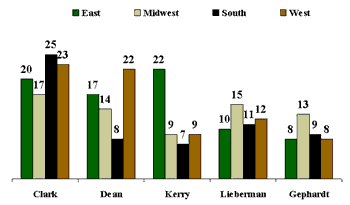 |
| Sept. 19-21 & Oct. 6-8, 2003 |
Clark and Dean are essentially tied in the West, at 23% and 22% support, respectively, while the other three major candidates receive from 7% to 12% support. Dean's support is in the double digits in the East, Midwest, and West, but is only at 8% in the South.
Kerry is decidedly a regional candidate, getting his strongest support in the East (22%), but not faring especially well elsewhere, getting only 7% to 9% support outside his home region.
Lieberman receives fairly consistent support across the four regions, from 10% to 15%. Gephardt's support is also relatively consistent, from 8% to 13%. These last two candidates do not lead in any region of the country.
Gender Gap
Support for the Democratic candidates is fairly close between men and women, except when it comes to their support of Clark. A military man, he receives 29% support among men, making him the clear winner in this group by 12 percentage points over his closest challenger.
| Support for Democratic Candidates Compared by
Gender (Percent Support) |
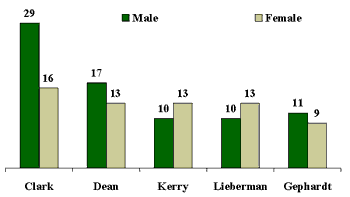 |
| Sept. 19-21 & Oct. 6-8, 2003 |
Democratic women show less of a consensus, with 16% support for Clark (13 percentage points lower than support among men), but 13% support each for Kerry, Dean, and Lieberman, and 9% support for Gephardt.
Age Differences
In general, there are few differences in support among the four age groups. However, Clark enjoys especially strong support among Democrats 65 and older (32%), though he also gets from 18% to 21% support among the three younger age groups.
| Support for Democratic Candidates Compared by
Age (Percent Support) |
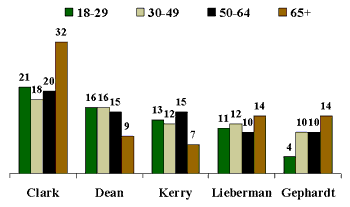 |
| Sept. 19-21 & Oct. 6-8, 2003 |
Dean and Kerry fare poorly among that oldest group, while Gephardt is especially weak among the youngest age group (under age 30).
Ideology
As the first declared candidate to attack the Bush administration for its conduct of the war in Iraq, Dean appeals especially strongly to liberals in the Democratic Party -- receiving 24% support, the most of any candidate. Among moderates (11% support) and conservatives (7%), Dean's support drops considerably.
| Support for Democratic Candidates Compared by
Ideology (Percent Support) |
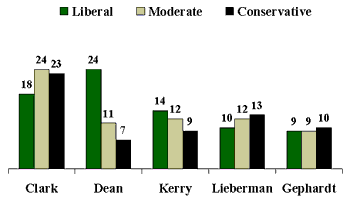 |
| Sept. 19-21 & Oct. 6-8, 2003 |
Clark fares well among all three ideological groups, though he does somewhat better among moderates (24%) and conservatives (23%) than among liberals (18%).
Kerry's support shows a slight tilt in the liberal direction, while Lieberman's tilts in the opposite direction. Gephardt's support is virtually the same among all three groups.
Religion
As a Catholic, Kerry receives twice as much support from Catholics (18%) as from Protestants (8%).
| Support for Democratic Candidates Compared by
Religion (Percent Support) |
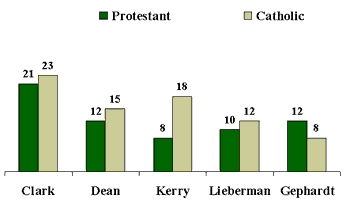 |
| Sept. 19-21 & Oct. 6-8, 2003 |
There are only slight differences in support among Catholics and Protestants for the other candidates.
Survey Methods
The latest results are based on telephone interviews with 1,017 national adults, aged 18 and older, conducted Oct. 6-8, 2003. For results based on the total sample of national adults, one can say with 95% confidence that the margin of sampling error is ±3 percentage points.
For results based on the sample of 400 Democrats and Democratic leaners who are registered to vote, the maximum margin of sampling error is ±5 percentage points.
For results based on the COMBINED SAMPLES OF 823 Democrats and Democratic leaners who are registered to vote, the maximum margin of sampling error is ±3 percentage points.
In addition to sampling error, question wording and practical difficulties in conducting surveys can introduce error or bias into the findings of public opinion polls.
